NAM Shop Talk Series: Meet Rep. Rudy Yakym
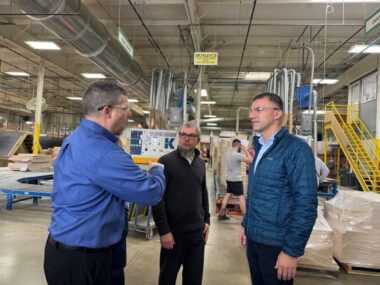
Rep. Yakym (at right) visits the shop floor of Kountry Wood Products in Nappanee, Indiana.
For Rep. Rudy Yakym (R-IN), Indiana’s 2nd Congressional District isn’t just a place on the map—it’s the beating heart of America’s manufacturing sector. It’s a district he proudly refers to as the “manufacturing capital of America.”
- “From the foundries to factory floors, Indiana’s 2nd District is where ‘Made in the USA’ happens,” said Rep. Yakym. “This district is home to some of the most decent and hardworking men and women anywhere in America. They contribute so much to our nation’s industrial base, and I take the responsibility of representing them very seriously.”
Personal connection: Representing this district in the House of Representatives, the fourth-generation Hoosier who was born and raised in South Bend brings a personal connection to manufacturing that shapes his vision for the future of the industry and fiscal responsibility in the United States.
- Before his political career, Rep. Yakym worked for supply chain management firm Kem Krest. His firsthand experience in the industry gave him a unique perspective on the challenges and opportunities within manufacturing.
- His brother Joel works in manufacturing, operating a large machine for Welch Packaging in Elkhart. “In his line of work, he has been able to provide a great living for his family, and I want more people to have those opportunities for rewarding, well-paying jobs,” said Rep. Yakym.
This deep-rooted connection to manufacturing is more than just a talking point for Rep. Yakym—it’s a cornerstone of his identity and legislative agenda.
Zoom out: Rep. Yakym’s commitment to manufacturing isn’t just lip service. He led a significant effort in the House of Representatives, rallying more than 140 Republican colleagues to support a tax package that would restore full R&D expensing, bonus depreciation and interest deductibility—key provisions of the NAM’s “Manufacturing Wins” campaign to preserve tax reform in its entirety.
- Although the package faced hurdles in the Senate, Rep. Yakym’s work laid the groundwork for future bipartisan efforts.
A collaborative spirit: Rep. Yakym’s dedication to bipartisanship is clear. He noted that if he had to choose a member of Congress of the opposing party he’d start a manufacturing company with, he didn’t hesitate to name Rep. Jimmy Panetta (D-CA). Rep. Yakym said they would produce RV components, an industry he knows well from his district, which includes Elkhart, the “RV Capital of the World.”
- “Jimmy and I serve on the House Budget Committee together, and he is always willing to build consensus and work across the aisle to find commonsense solutions,” said Rep. Yakym.
The vision: Looking ahead, Rep. Yakym envisions a future where manufacturing continues to be a pillar of the American economy, especially in his district. He wants the next generation to understand that viable, rewarding career paths in manufacturing are right in their backyard.
- “There is massive demand at the manufacturers in my district for welders, forklift drivers and other jobs that may otherwise be overlooked by students,” Rep. Yakym points out.
- “You can get a well-paying job straight out of high school that will offer on-the-job training. There is also a wealth of advanced manufacturing jobs available at medical device companies, as well as a number of battery manufacturers being brought online in the coming years.”
What’s next: As a congressman, Rep. Yakym’s primary goal is to restore fiscal responsibility in Washington. He sees this as essential not just for the country’s economic health, but also for national security.
- “The main reason I ran for office and my top priority in Congress is restoring fiscal responsibility so that future generations can inherit a nation every bit as prosperous and full of opportunity as the one we did,” said Rep. Yakym. “Getting our fiscal house in order is the most important long-term challenge we face as a nation.”
Only at the NAM: Shop Talk is a new series that aims to help you get to know the personal connections, insights and priorities of policymakers who impact our industry.
Rep. Feenstra Works to Repeal Estate Tax
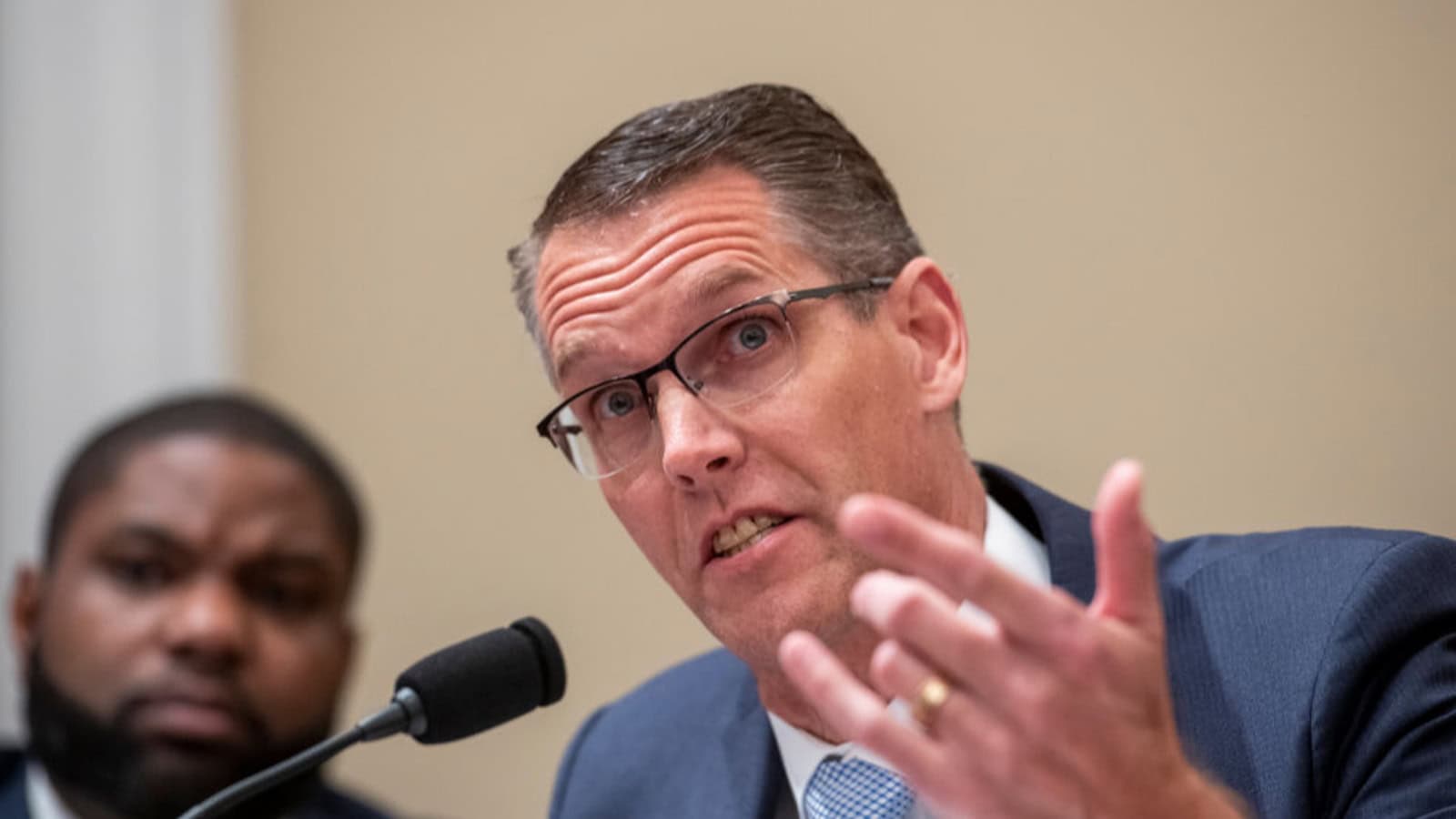
Rep. Randy Feenstra (R-IA), the vice chair of the House Ways and Means Committee’s Rural America Tax Team, is working to shield family businesses across America from damaging tax burdens by targeting the estate tax for repeal.
As part of the NAM’s “Manufacturing Wins” campaign, which aims to protect pro-manufacturing provisions from 2017 tax reform set to expire in 2025, the NAM spoke with Rep. Feenstra about his work and why it matters to manufacturers.
Nixing the tax: Tax reform doubled the valuation threshold under which family-owned businesses’ assets are exempt from the estate tax. While Rep. Feenstra is working to prevent that increased threshold from expiring, he has a bigger goal in sight: repealing the estate tax altogether.
- Feenstra is the sponsor of the Death Tax Repeal Act, which “makes the simple recognition that death should not be a taxable event,” he told us.
- “When a family is grieving, the federal government sends a multimillion-dollar tax bill as condolences. This is simply wrong.”
Listening to owners: Rep. Feenstra and his colleagues on the tax team have spoken to family businesses across the country, including manufacturers. These conversations have made it clear that “we still have a lot of work to do to provide relief from what can be a devastating setback for multigenerational family businesses,” he said.
- “Repealing this tax is going to be one of my top priorities in 2025, and I’m proud to have the support of 170 of my colleagues,” he added.
Persecuting small business: As Rep. Feenstra explains, the estate tax often threatens to destroy small manufacturers, whose value is often tied up in illiquid assets like equipment and facilities.
- “People often don’t realize that businesses over many generations can accumulate assets that can put them over the asset threshold, but that doesn’t mean these businesses have a lot of cash on hand,” he explained. “So, when they’re hit with millions in new taxes, that can sink an already cash-strapped business.”
- “Fortunately, because of the doubling of exemption amount, far fewer businesses face that threat,” he added. However, “As long as any family business does face that threat, we still have work to do.”
If tax reform expires… Rep. Feenstra warns that if tax reform’s estate tax changes expire, many additional smaller businesses will suffer.
- “A lot more people would be hit by the death tax, and the people who are hit would be paying a much higher tax,” he said.
- “These are small family businesses we are talking about, and if the current exemption amount is allowed to return to half its current value, that means the size of the businesses getting hit are much smaller than they are today.”
The last word: “As we go into 2025, we need to be focused on policies that support growth and help [family-owned] businesses succeed, not create costly obstacles for them to overcome,” Rep. Feenstra concluded.
Learn more: You can read our full Q&A with Rep. Feenstra here and learn more about the NAM’s “Manufacturing Wins” tax campaign at NAM.org/MfgWins.
Estate Tax: A Q&A with Rep. Randy Feenstra
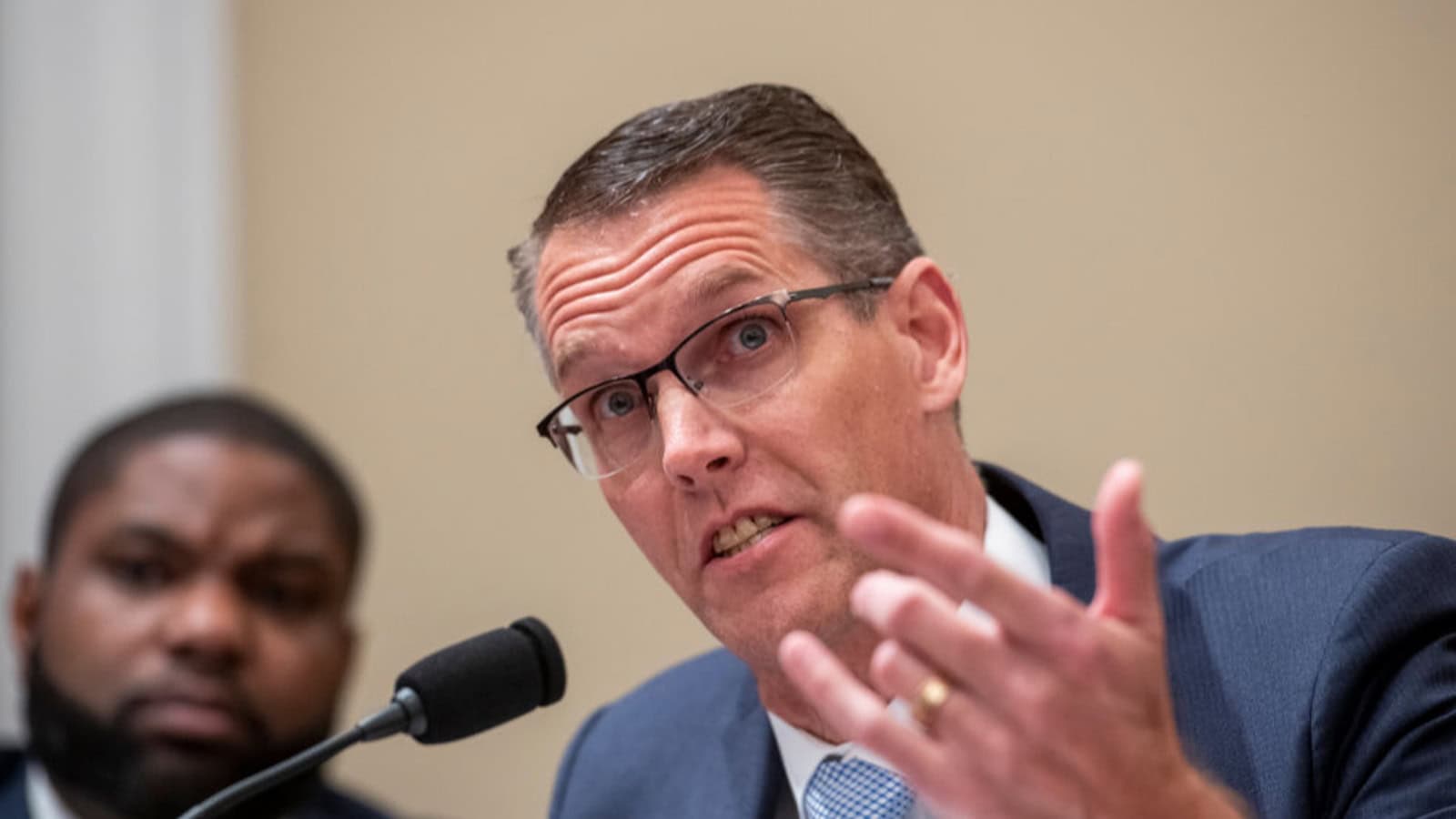
The NAM recently interviewed Rep. Randy Feenstra (R-IA), the vice chair of the House Ways and Means Committee’s Rural America Tax Team, about the estate tax and why he’s working with colleagues on Capitol Hill to repeal it.
NAM: Rep. Feenstra, Congress is facing a “Tax Armageddon” next year, as crucial provisions from 2017’s Tax Cuts and Jobs Act are set to expire. As a member of the Ways and Means Committee, what is your focus moving into next year’s debate?
Rep. Feenstra: One of those crucial provisions from the Tax Cuts and Jobs Act that is set to expire is the doubling of the estate tax exemption amount, which currently sits at $13.6 million in 2024. After 2025, it will return to half that amount, adjusted for inflation. That change in the Tax Cuts and Jobs Act was another important step toward full repeal of the estate tax, which my Death Tax Repeal Act would do. The bill makes the simple recognition that death should not be a taxable event. When a family is grieving, the federal government sends a multimillion-dollar tax bill as condolences. This is simply wrong.
I’m proud to co-chair the Rural America Tax Team, which has dug into this issue of the “death tax” and the impact it is having on family businesses across the country. As the tax team has spoken to family businesses and estate tax experts from across the country, it’s become increasingly clear that we still have a lot of work to do to provide relief from what can be a devastating setback for multigenerational family businesses. Repealing this tax is going to be one of my top priorities in 2025, and I’m proud to have the support of 170 of my colleagues.
NAM: The estate tax is imposed on family-owned businesses when ownership of the business passes to the next generation following the death of an owner. As you mentioned, the TCJA doubled the exemption threshold, excluding more assets from taxation and thus reducing the burden of the estate tax on businesses. Why is this important and what is Congress doing to preserve this higher threshold?
Rep. Feenstra: Over the years, various bills have taken steps toward providing relief for taxpayers hit by the death tax. The Tax Cuts and Jobs Act was one of the largest expansions of that relief, significantly reducing the number of family businesses hit by the tax and reducing the tax burden for those businesses that still are. People often don’t realize that businesses over many generations can accumulate assets that can put them over the asset threshold, but that doesn’t mean these businesses have a lot of cash on hand. So when they’re hit with millions in new taxes, that can sink an already cash-strapped business. Fortunately, because of the doubling of the exemption amount, far fewer businesses face that threat. As long as any family business does face that threat, we still have work to do.
NAM: At the end of 2025, the estate tax is scheduled to be reduced by half, subjecting more of family-owned manufacturers’ assets to taxation and increasing their estate tax liability. As the Ways and Means Committee and tax teams continue meeting with businesses around the country, what are you hearing on the impact this change would have?
Rep. Feenstra: Two things: A lot more people would be hit by the death tax, and the people who are hit would be paying a much higher tax. These are small family businesses we are talking about, and if the current exemption amount is allowed to return to half its current value, that means the size of the businesses getting hit are much smaller than they are today. People often think of farms, and that’s certainly true, but as you know, manufacturers are hit, family-owned restaurants, auto dealers, you name it. As we go into 2025, we need to be focused on policies that support growth and help these businesses succeed, not create costly obstacles for them to overcome. If the exemption amount falls to its pre–Tax Cuts and Jobs Act level, that’s a lot of new businesses that are going to be hit by this tax.
Rep. Garbarino, NAM Talk CIRCIA Flaws
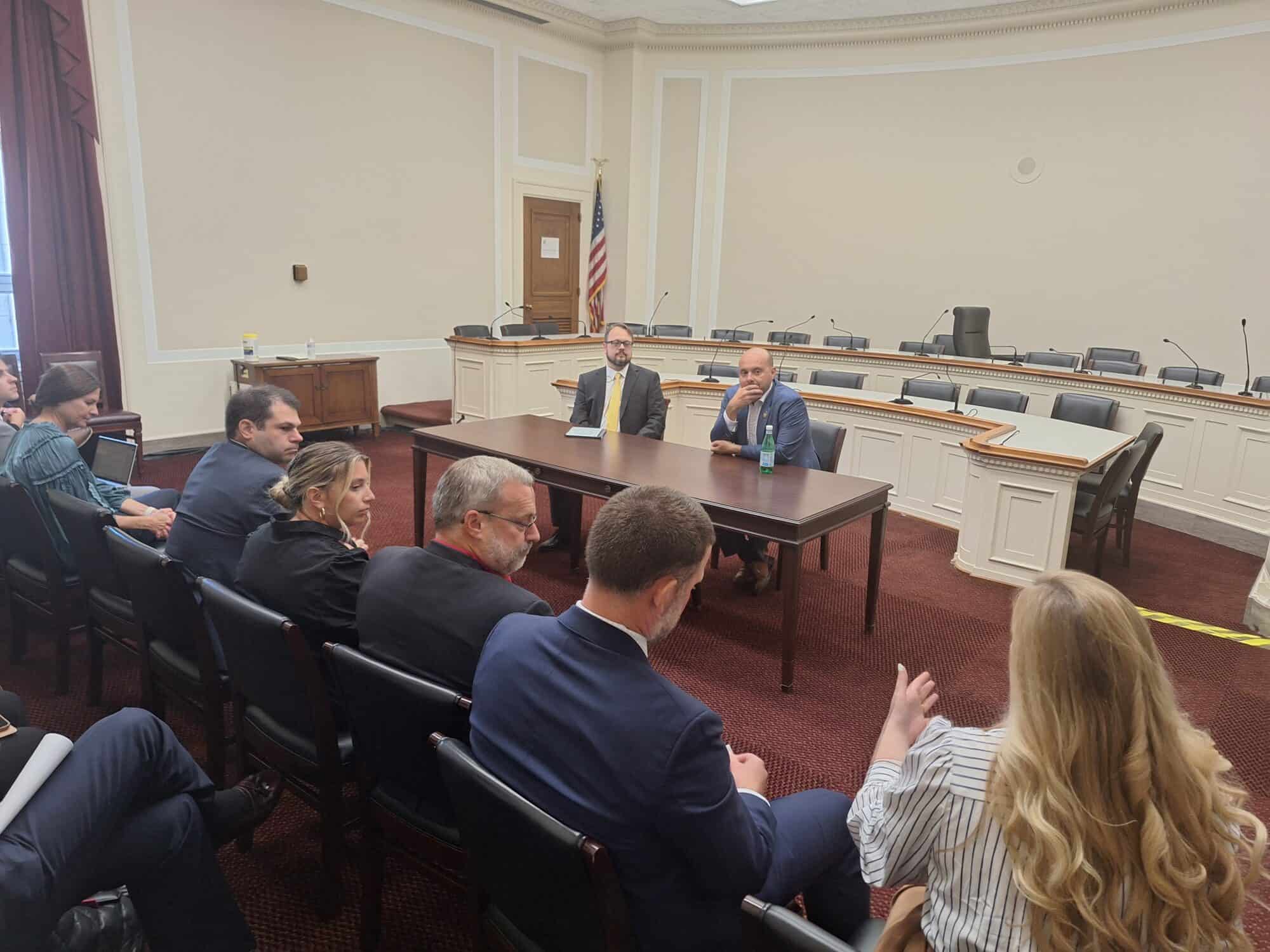
A draft Department of Homeland Security rule requiring that certain sectors expedite cyber-incident reporting has several shortcomings that must be addressed before the rule becomes final in the fall of 2025, the NAM told Rep. Andrew Garbarino (R-NY) in a meeting this week.
What’s going on: Rep. Garbarino, chair of the House Homeland Security Subcommittee on Cybersecurity and Infrastructure Protection, met with manufacturers and the NAM Technology Policy Committee Tuesday to talk cybersecurity issues.
- Much of the discussion focused on draft rulemaking published in April by the DHS’s Cybersecurity and Infrastructure Security Agency. It would require “covered entities” in “critical infrastructure sector[s]” to report any major cybersecurity incidents to CISA within 72 hours.
- Under the Cybersecurity Incident Reporting for Critical Infrastructure Act, CISA must finalize the rule by October 2025.
Why it’s a problem: The NAM agrees with the concerns Rep. Garbarino raised with CISA, including:
- The burden associated with imposing onerous reporting mandates on companies recovering from cyberattacks;
- An overbroad scope, which forces into compliance both organizations that are not truly “critical infrastructure” and those that are too small to have the resources needed to complete the required actions;
- An overbroad definition of incidents requiring reporting;
- An excessive amount of required information;
- An unreasonably high cost of compliance and the diversion of resources away from cyber-incident response; and
- The risk that the proposed rule will jeopardize CISA’s role as a trusted partner of industry.
NAM in action: The NAM submitted comments in response to CISA’s proposal earlier this year outlining these concerns, as well as calling for a reduction in both the number of entities required to file incident notifications and the number of incidents they have to report.
The NAM says: “CISA needs to significantly rethink its approach to CIRCIA’s implementation,” said NAM Senior Director of Technology Policy Franck Journoud.
- “The proposed rule requires far too much information about far too many incidents from far too many companies. CISA should not mandate that companies under attack from hackers divert precious security resources to generate mountains of incident data that CISA will not have the means to process or act upon.”
Take precautions: If you are looking to strengthen your company’s cyber protections, check out NAM Cyber Cover, an affordable, broad security program for NAM members that provides proactive monitoring with automated alerts at no extra cost.
Rep. Chavez-DeRemer Urges Pro-Growth Tax Policy at Miles Fiberglass
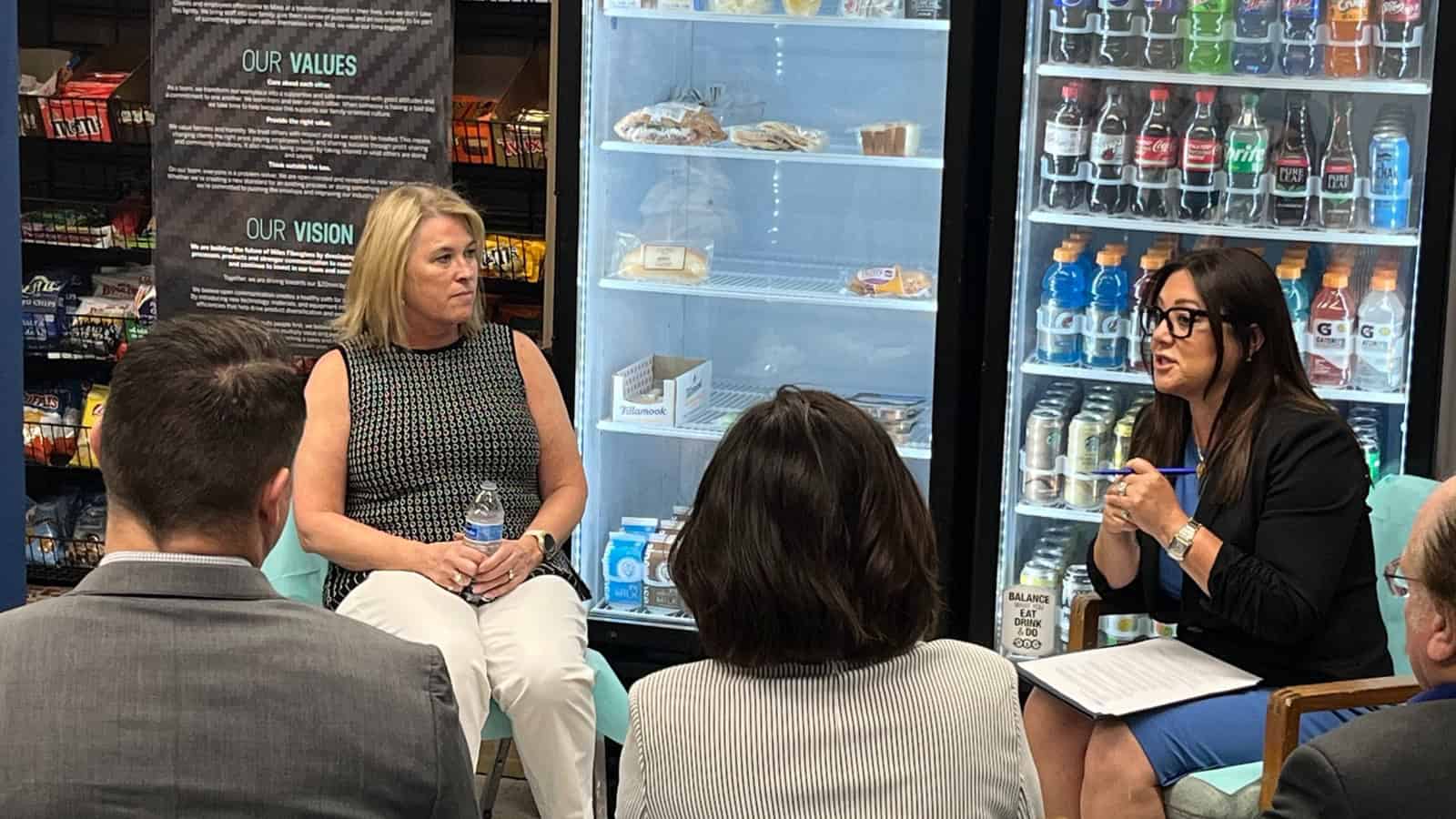
Congresswoman Lori Chavez-DeRemer (R-OR) visited Miles Fiberglass & Composites in Clackamas, Oregon, for a roundtable discussion with local manufacturers and other business leaders on the critical need to protect manufacturing-friendly tax policies. Moderated by Miles Fiberglass President and owner and NAM board member Lori Miles-Olund and attended by representatives of the NAM and Oregon Business & Industry, the discussion centered on the importance of preserving the 2017 Tax Cuts and Jobs Act, which has been a lifeline for small manufacturers.
Stimulating growth: “The 2017 Tax Cuts and Jobs Act freed up capital for us to hire more people, invest in new equipment and increase wages,” said Miles-Olund. “It’s essential for manufacturers like us to have a pro-growth tax code that allows us to stay competitive and innovate.”
- The 2017 reforms lowered the corporate tax rate and provided a 20% pass-through deduction for small businesses, boosting their growth for the past seven years.
- However, with key provisions set to expire in 2025, many manufacturers are concerned about the harm to their businesses if Congress fails to act.
A looming threat: Rep. Chavez-DeRemer addressed the impending expiration of these tax provisions, saying, “We cannot afford to return to a tax system that punishes manufacturers for investing in the U.S.”
- She also highlighted the economic ripple effects of tax hikes, noting that when manufacturers are forced to scale back investments, it affects not just their operations but also their suppliers and communities.
- OBI President and CEO Angela Wilhelms echoed these concerns. “Preserving these tax reforms is essential to ensuring that Oregon businesses remain competitive on a global stage,” she said.
Empowering women: Rep. Chavez-DeRemer also discussed the importance of empowering women in the manufacturing sector. She praised Miles Fiberglass’ efforts to recruit more women, adding that legislation like the National Apprenticeship Act can help open doors for women and close the skills gap in manufacturing.
The last word: “We need policies that allow manufacturers to thrive,” Rep. Chavez-DeRemer said. “Congress must prioritize protecting jobs, ensuring economic stability and keeping American manufacturing competitive.”
If you want to add your voice to the fight for tax reform, or host legislators for a facility visit, check out the NAM’s “Manufacturing Wins” campaign.
Small Manufacturers Speak Out Against the Estate Tax

Passing on the family business can also mean passing on a big tax bill, and family-owned manufacturers are speaking out to keep those bills from getting any bigger.
What’s happening: As part of its “Manufacturing Wins” campaign to preserve 2017 tax reform, the NAM is calling on Congress to secure the law’s changes to the estate tax.
- Tax reform increased the estate tax exemption threshold, which protects some of a family-owned business’s assets from the tax.
- The threshold is set to be slashed in half at the end of 2025, subjecting more of family-owned manufacturers’ assets to taxation and making it harder for them to pass their business on to the next generation.
Protecting physical assets: Manufacturers constantly invest in physical assets like facilities and machinery to stay competitive, making the estate tax especially damaging.
- “We’re not a liquid company,” said Tom Tredway, president of Erie Molded Packaging in Pennsylvania. “Almost every penny we earn is poured back into our business so we can grow and compete. The increased estate tax exemption threshold is set to expire at the end of 2025, which will threaten my ability to pass the business on to my children.”
- “The estate tax doesn’t just hurt family businesses—it hurts the workers,” added Scott Livingston, president and CEO of HORST Engineering in East Hartford, Connecticut. “It also hurts our customers and the communities that we serve.”
Preserving company values: For Click Bond, a family-owned adhesives manufacturer in Carson City, Nevada, paying a higher estate tax bill could mean compromising the business’s vision and values.
- “We may have become a family business by happenstance, but we remain one by strategy,” said CEO Karl Hutter. “With reduced lifetime estate tax exemptions, family businesses will face the threat of having to liquidate, divest or take in outside capital that may not align with their strategy or values simply to create liquidity to pay a tax bill.”
- “The estate tax rips financial resources from productive organizations,” said Dave True of the 76-year-old True Companies in Casper, Wyoming. “These financial resources are critical to small companies and the families they support.”
Saving livelihoods: For some families, the estate tax threatens to turn a death in the family into the death of the business.
- “When I lost my husband to brain cancer, not only did I have to worry about keeping the business afloat, but I also had to worry about a looming tax bill that might have forced us to halt production altogether,” said Courtney Silver, president and owner of Ketchie, Inc. in Concord, North Carolina.
- Silver, who chairs the NAM’s Small and Medium Manufacturers Group, continued: “If not for the federal estate tax exemption being increased in 2017, Ketchie might not be here today.”
The last word: Lori Miles-Olund, the third-generation owner and president of Miles Fiberglass & Composites, Inc. in Clackamas, Oregon, put it simply: “Congress must preserve the increased estate tax exemption to protect family-owned businesses like ours from potential insolvency when the owner passes away.”
Curb Proxy Firms, NAM Tells Congress
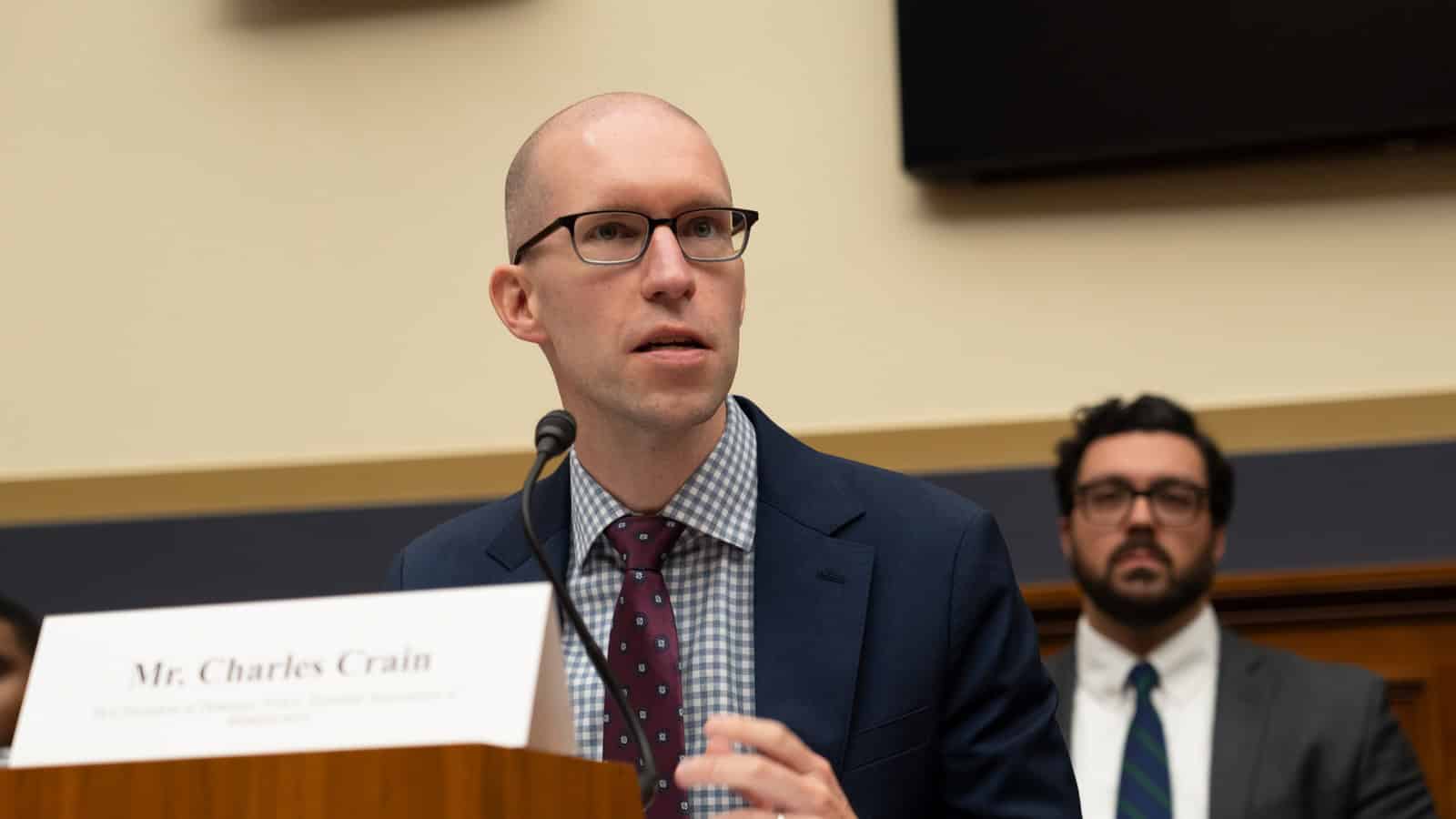
Less than three months after scoring a significant win for manufacturers against Securities and Exchange Commission overreach, the NAM was back in front of Congress to urge regulatory oversight of proxy advisory firms.
What’s going on: On Tuesday, the NAM testified before the House Financial Services Oversight and Investigations Subcommittee on the need to bring oversight and accountability to proxy advisory firms. These are entities that make recommendations regarding the way shareholders should vote on proxy ballot proposals brought before publicly traded companies.
- “Proxy firms are powerful, unaccountable actors that pose a real threat to Americans’ financial security. Manufacturers have been subject to these firms’ outsized influence for far too long,” NAM Vice President of Domestic Policy Charles Crain said during Tuesday’s hearing.
The background: In 2020, the SEC finalized an NAM-supported rule instituting important proxy reforms, such as requiring proxy firms to disclose any conflicts of interest. The NAM has fought in court to preserve the 2020 rule, successfully defeating the SEC’s attempts to suspend the rule and to rescind its most crucial provisions. The NAM is now back in court in a third case, defending the SEC’s authority to regulate these powerful market actors.
Surrendering to ISS: Institutional Shareholder Services Inc., the largest and most influential proxy advisory firm, is now “suing the SEC over its authority to issue the 2020 rule—not just the rule’s particulars, but the SEC’s ability to regulate proxy firms at all,” Crain continued.
- Troublingly, “the SEC is waving the white flag in the face of [the] challenge,” he told lawmakers, referring to the agency’s decision not to appeal after a district court sided with ISS earlier this year.
“Sole defender”: The NAM—now the “sole defender of the 2020 rule”—is appealing the district court’s decision.
What Congress should do: Legislators must take up the mantle, too, Crain concluded.
- “Congress should do what the SEC will not: affirm the SEC’s clear authority, provide much-needed oversight and accountability and help manufacturers and Main Street investors escape the outsized influence of proxy advisory firms.”
The NAM Briefs Congress on AI
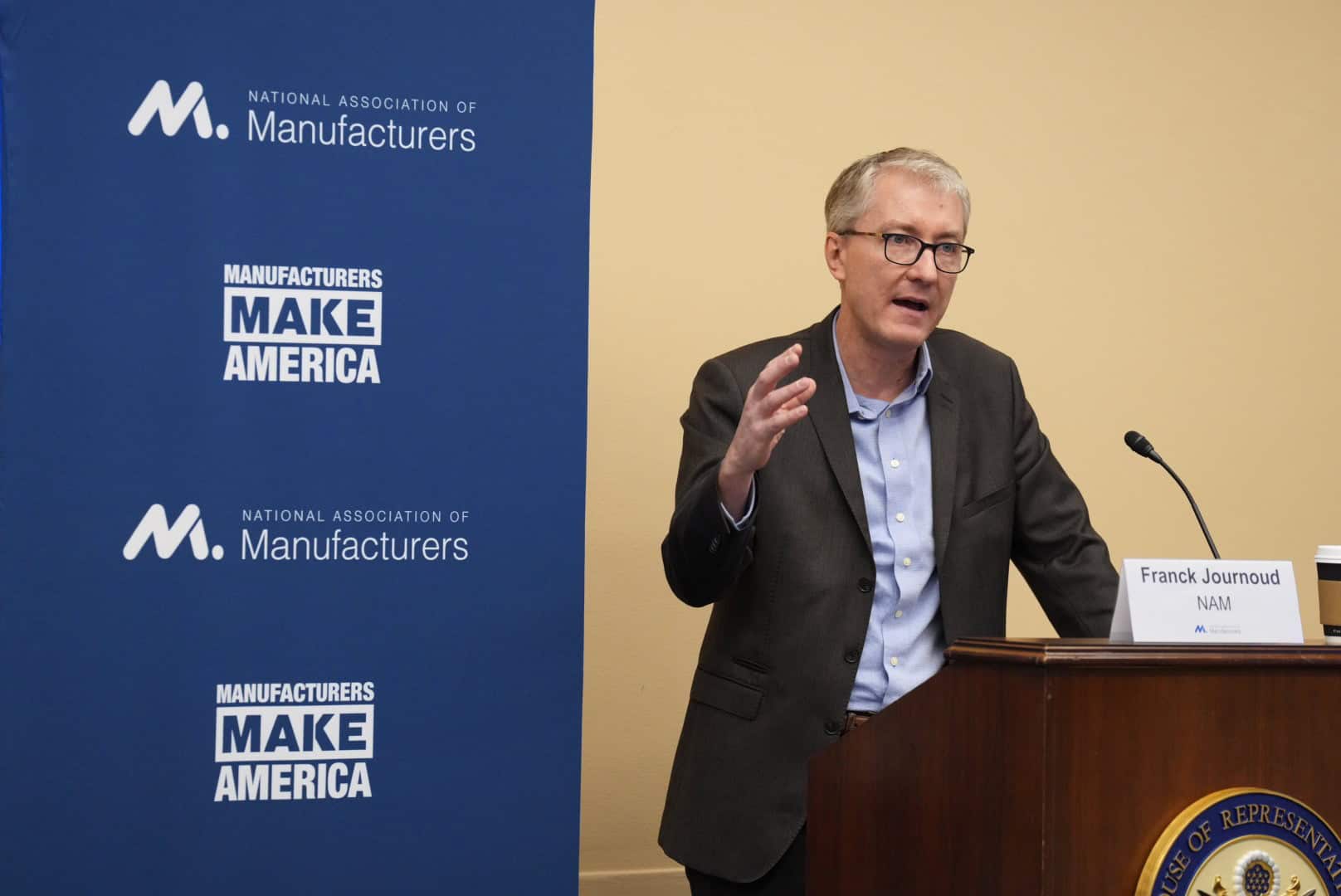
Generative AI tools like ChatGPT and Midjourney have grabbed headlines, but artificial intelligence–driven innovations like digital twins, computer vision and robotics are also transforming manufacturing in America.
Last week, the NAM briefed congressional staff from the House Task Force on AI to help educate policymakers on the role manufacturers are playing as both developers and deployers of AI technologies. The briefing follows the publication of the NAM’s first-of-its-kind white paper on the ways manufacturers are using AI.
The briefing featured a panel discussion among AI experts from major manufacturers, as well as the AI leads from the NAM and the Manufacturing Leadership Council.
Faster breakthroughs: AI is accelerating research and development at manufacturing companies, the panelists reported, allowing them to create or improve products in record time.
- For example, pharmaceutical companies are using AI to develop and test new lifesaving drugs, while automakers are using it to improve vehicle components.
Increased safety: AI is helping to prevent accidental collisions on the shop floor and enhancing equipment that makes tasks safer, such as robotic exoskeletons that collect and learn from data on the wearers’ movements and environment.
- In addition, companies are using AI to better understand and monitor product performance, helping reduce maintenance costs and avoid dangerous malfunctions.
Augmenting human labor: Manufacturers often use AI technology to complement and augment the work of humans, according to the panelists.
- Human operators still make decisions and oversee operations, but AI has helped improve the reliability of manufacturers’ processes as well as the quality, delivery and safety of their products.
- This combination of human ingenuity and AI enhances efficiency while still prioritizing human experience.
Policy recommendations: Panelists discussed what Congress can do to support AI-driven growth in the manufacturing sector, including:
- Modernizing compliance requirements to support AI development and adoption, especially for small manufacturers most affected by regulations;
- Ensuring that the regulatory environment helps the U.S. maintain global leadership in AI innovation, including by adjusting rules based on context and risk; and
- Creating or supporting initiatives to train workers in AI-related skills, including by providing the data needed to develop these programs.
The last word: “The future of manufacturing is inseparable from the future of AI,” said NAM Senior Director of Technology Policy Franck Journoud.
- “It is crucial that policymakers hear directly from manufacturers that are leading the development and adoption of this transformative technology. The NAM is thankful to have had an opportunity to share this world-class expertise, and we are committed to working with Congress to ensure the U.S. remains a global leader in AI innovation.”
The Estate Tax, Explained

Congress should preserve tax reform’s changes to the estate tax, protecting family-owned manufacturers from tax increases scheduled for the end of 2025, according to a new explainer published by the NAM as part of its “Manufacturing Wins” tax campaign.
The background: In 2017, tax reform doubled the value of assets that could be exempt from the estate tax, a levy imposed on family businesses upon the death of their owners, when proprietorship passes to the next generation.
What’s going on: This valuation threshold is scheduled to be cut in half at the end of 2025, subjecting more assets of family-owned manufacturers to taxation and increasing these companies’ tax liability.
Why it’s important: A bigger tax burden would threaten the continued existence of family-owned companies and make it more difficult to pass family businesses on to the next generation.
- These firms could be forced to liquidate operation-critical assets, such as facilities and equipment, in order to pay the estate tax.
- An increased estate tax bill could mean that family-owned manufacturers are forced to take on debt, limit operations, reduce employee headcount or close entirely following the death of a loved one.
What else is at risk: Some legislators have floated the idea of repealing or limiting stepped-up basis, which stops a business owner’s heirs from being forced to pay capital gains taxes on asset appreciation that took place while the owner was alive.
What must be done: “Congress must preserve tax reform’s increased estate tax exemption threshold and maintain stepped-up basis,” said NAM Vice President of Domestic Policy Charles Crain.
- “Protecting family-owned manufacturers from the estate tax will prevent these small businesses from incurring costly and damaging tax bills that threaten their viability following the death of a loved one.”
NAM to EPA: Reissue Formaldehyde Analysis

The Environmental Protection Agency’s final formaldehyde analysis—issued in August and set to inform future regulations—risks “creat[ing] an unachievable standard and a de facto ban” on an essential manufacturing material, the NAM said.
What’s going on: On Aug. 20, the EPA’s research office issued its conclusions about the “amount of the chemical that could be harmful” to humans, saying that “[s]mall amounts … can increase people’s risk of [health] problems” (Bloomberg Law, subscription).
- Though the report itself does not mandate any new restrictions on the industry, the EPA is likely to use the findings to take the next step in the regulatory process—a final risk evaluation—by the end of 2024 (The Hill).
- The assessment maintains the formaldehyde threshold of 11 parts per billion proposed by the agency in 2022. That’s 30 times lower than Europe’s recently updated worker-exposure limit of 300 parts per billion and “lower than what can be found in homes or even background levels for outdoor air,” the NAM told the EPA.
Why it’s a problem: Formaldehyde is used widely across industries to produce numerous everyday items, including plastics, lubricants, automotive parts, fertilizers, adhesives and more.
- The final analysis, which was released without review by the EPA’s own Science Advisory Committee on Chemicals, fails to account for “the highly developed safety procedures, protocols and [personal protective equipment] used throughout [the manufacturing] industry.”
- A severe restriction on the allowable workplace threshold of formaldehyde “could wreak havoc on domestic supply chains,” according to the NAM.
What should be done: The EPA should reissue its risk evaluation to give the SACC an opportunity to review it and provide comments—“and allow for additional public comment after the SACC review is complete,” the NAM concluded.
